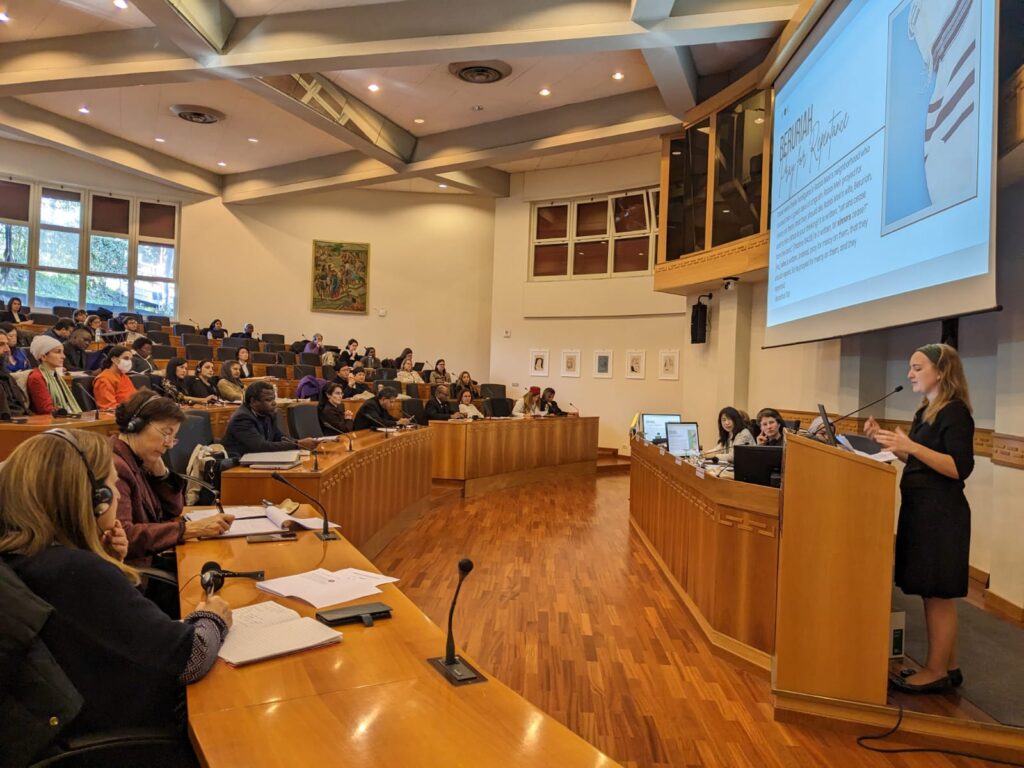Photo Credit: World Union of Catholic Women’s Organisations
JPII Leader Rabbi Allyson Zacharoff’s (Cohort VI, USA) devotion to interreligious dialogue was present in her participation as a featured speaker in “Women Building a Culture of Encounter Interreligiously,” an international conference held this month in Rome. Held on January 25-27, this three-day conference featured a variety of speakers from different backgrounds and faith traditions. Along with panels and open discussions, there were also moments to network—to connect and engage in dialogue with one another—and an audience with Pope Francis.
Indeed, in his speech to speakers and invited guests, Pope Francis remarked on this wonderful event: “It is not a common occurrence for followers of twelve religions from around the globe to come together and discuss important questions concerning encounter and dialogue for promoting peace and understanding in our wounded world.”
“Interreligious dialogue remains a vital part of our world as we strive for greater peace than has ever existed previously,” states Rabbi Zacharoff.“It is so important because we see the amazing power religion has to bring us together, but also the ways in which all too often it has torn us apart. We need to find better ways than ever before to grow in understanding, respect, and ultimately, love.”
Held by the Dicastery for Interreligious Dialogue in collaboration with the World Union of Catholic Women’s Organisations and the Pontifical Urban University, this conference seeks, according to its “Goals of the Conference,” “to open a dialogue with women of other religious traditions to talk, walk and work together to foster a better world where each upholds the dignity of all.”
Rabbi Zacharoff reflects: “This conference raises up the very important piece of women’s participation in our society at large, and in interreligious spaces in particular—a massive contribution that needs to be celebrated even more. The opportunity to have these conversations around the role of women in the field with people from all over the world, to bring a global perspective to the incredible value of this encounter work, will allow us all to truly grow in our understanding of how female leadership plays out in different contexts, and hopefully also help inspire us all into how we might even grow the role of women in the field. It is critical that both our dialogues and leadership of those dialogues accurately represent the beautiful diversity within our own communities, and we know how much women lead and do for our communities–it is essential that they should be involved here, as well.”
This three-day conference has three principle goals: (1) “to appreciate and encourage the role of women and women’s leadership in social, economic, religious and political life at local, national and international levels”; (2) “to rediscover how our respective religious classics, saints/sages, religious arts and music can be shared to reawaken our spiritual energy, to heal us and the world”; and (3) “to learn from the stories of women in fostering interreligious dialogue and a culture of encounter.”
Rabbi Zacharoff shares that she is inspired in particular by the conference’s goal of communal and global healing. “Our worldwide community is in need of healing in so many various ways, with each country or community in need of different healing,” continues Rabbi Zacharoff. “I find this goal so unique and inspiring, that we can seek healing and inspiration from our various traditions as we come together in our differences and seek to build a better world.”
Addressing the speakers and invited guests, Pope Francis said: “I encourage you to continue this important work together, sharing with one another the insights and practices that give you strength and creativity as you strive in your particular contexts to offer healing to many people who are seeking not only material relief from suffering, but above all, a sense of meaning and purpose for their lives. In this regard, I am grateful to you for your commitment and effort to foster the dignity of women and girls in particular.”
The conference’s emphasis on encounter is based, in part, on the teachings of Pope Francis: “We, as a people, should be passionate about meeting others, seeking points of contact, building bridges, planning a project that includes everyone. This becomes an aspiration and a style of life” (Pope Francis, Fratelli Tutti 216).
Rabbi Zacharoff reflects on the meaning of encounter: “The only true way to come together in holy understanding is to meet our neighbors as they are in their fullness–even and especially where we disagree. It often matters less that we disagree than how we disagree: we must explore our differences and similarities with honor and respect for the other, remembering the key piece we learn in Jewish tradition, betzelem Elohim—-that we are all created in the image of G-d, and that does applies even to those with whom we disagree or even dislike.”
“It is through honest dialogue as we strive to genuinely learn about others while also sharing of ourselves that we can approach a world in which we feel authentic love for others in our differences,” Rabbi Zacharoff concludes, “A culture of true encounter must include space for us to listen, and also us to share, and a space that feels safe for everyone to bring their true authentic selves.
Read more about “Women Building a Culture of Encounter Interreligiously” here.

